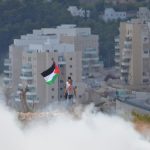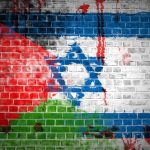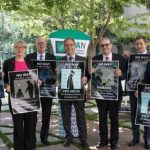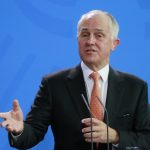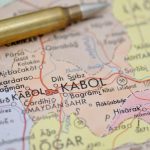Israel “Constitutionally” Enshrines Its Apartheid System
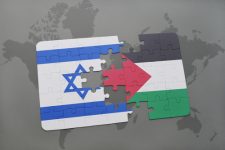
On 19 July, the Knesset – the Israeli parliament – passed the Nation-State Law, which officially relegates Palestinians in Israel to the rank of second-class citizens. This has effectively enshrined Israel’s decades-old system of apartheid in the nation’s Basic Laws: its de facto constitution.
The legislation stipulates that only Jewish people have the right to self-determination in Israel. And it also downgrades Arabic from an official language to a “special status” language that enables it to still be used in institutions, leaving Hebrew as the sole official language.
The law further outlines that the “state views the development of Jewish settlement as a national value, and will act to encourage and promote its establishment and consolidation.” The Netanyahu government is currently seeking to expand these settlements, which violate international law.
Following the passing of the bill, Arab MP Ahmed Tibi said, “I announce with shock and sorrow the death of democracy.” And the European Union has condemned the new laws, declaring they’re a further threat to the two-state solution to the Israel-Palestine conflict.
Bolstering discrimination
“The law reinforces the inferior status of Israel’s non-Jewish citizens by affirming that Israel is the nation-state of the Jewish people rather than of its citizens,” Australia Palestine Advocacy Network president Bishop George Browning told Sydney Criminal Lawyers®.
“Israel has always discriminated against its Indigenous non-Jewish Palestinian population,” he continued, adding that the new laws won’t “practically disadvantage non-Jews” any more than they currently are in the short term.
According to the Bishop, in regard to the occupied territories, the legislation “presents two important obstacles to peace.” The first is its focus on promoting the expansion and development of Jewish settlements.
And the second threat to bringing about an end to conflict is that the Nation-State Law “declares that the “unified and complete” city of Jerusalem is the capital of Israel,” which prevents “the establishment of a Palestinian capital in East Jerusalem.”
Brutality alongside fanfare
The passing of these polarising laws follows the controversial opening of the United States embassy in Jerusalem on May 14 this year, which was a move in line with the Trump administration’s stance of officially recognising the city as the capital of Israel, which was announced last December.
As president Trump’s daughter Ivana presided over the opening, Israeli forces were firing upon thousands of Palestinian protesters amassed along the border between Israel and the Gaza Strip just 70 kilometres away. Fifty eight unarmed Palestinians demonstrators were killed that day.
Dubbed the Great March of Return, the rally attracted 30,000 demonstrators who were demanding their right to return to their homes in what is now Israel, as well as calling for an easing of the Israeli commercial goods blockade that Gaza has been subjected to since 2007.
The killing of the protesters came just one day before the 70th anniversary of the Nakab, which saw 750,000 Palestinians forcibly displaced from their homes and pushed into refugee camps in the West Bank, Gaza, East Jerusalem and neighbouring countries, as the Israeli state came into being.
Incarcerating Palestinian children
The Israelis state continues to arrest and detain between 500 and 700 Palestinian children a year. These minors are subsequently prosecuted in the nation’s military court system, often for the crime of throwing stones.
On June 30 this year, 273 Palestinian children were being detained in Israeli prisons. And around 60 percent of the kids who are sentenced to prison time are then transferred from the occupied territories to facilities inside Israel in violation of the Fourth Geneva Convention.
In March this year, Ahed Tamimi was sentenced to eight months prison for slapping and shoving two heavily armed Israeli soldiers in her family’s front yard. The incident occurred just an hour after the girl learnt that her cousin had been shot in the head with a rubber bullet by an Israeli soldier.
The Tamimi family live in an area of the West Bank that’s continually being encroached upon by illegal Israeli settlements. Since her arrest, Ms Tamimi has become an international symbol of Palestinian resistance.
The 17-year-old was released from prison in late July. On release, the teenager said that she was proud to have brought global attention to the plight of the Palestinian people and she vowed to study international law, so that one day she can represent Palestine.
Discrediting the Palestinian Authority
In early July, Australian foreign minister Julie Bishop announced that Australia was cutting direct aid to the Palestinian Authority (PA) that was being sent via the World Bank. She said Australia will now be sending aid to the occupied territories through the United Nations.
The minister said the donations were being redirected over concerns the PA could use them to fund politically-motivated violence. This was despite the minister making clear that she was confident the self-governing body had never used the funds in this way.
Indeed, Bishop Browning pointed out that the PA actually works closely with the Israeli military in suppressing Palestinian militancy in the occupied territories.
“The claim that Australian aid to the PA could be used to fund politically-motivated violence is a part of a broader campaign to discredit and marginalise the PA,” the Bishop explained.
“Regrettably, the Turnbull government has consistently failed to distinguish Australia’s national interests from the demands of the Australian Israel Lobby,” he continued.
Blind support
Following the massacre of the Palestinians protestors in May, Australia and the United States were the only two countries that voted against launching an independent investigation into the human rights abuses in Gaza at a special meeting of the United Nations Human Rights Council.
Australia believed that “Israel had legitimate security concerns,” the notes to the meeting reveal. Although, this country did express “deep sadness and regret about the loss of life and injury” that occurred at the demonstration.
Bishop Browning stressed that these recent moves by the Australian government were nothing new, rather the support of Israel in the face of its ongoing atrocities and discriminatory policies has been the consistent position of the Abbott/Turnbull government.
“Even in 2016, when the United States abstained from vetoing a UN Security Council resolution condemning Israeli settlement activity in the occupied territories, Israel and Australia were alone in denouncing the resolution,” he concluded.


